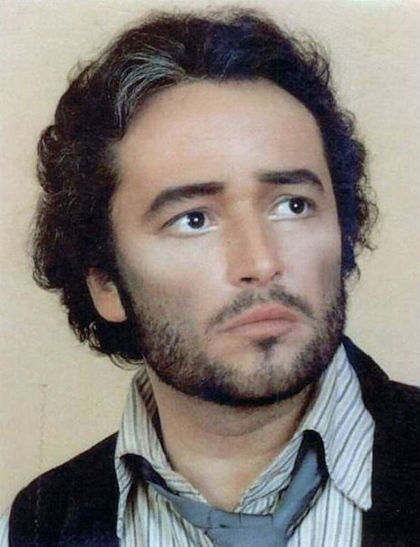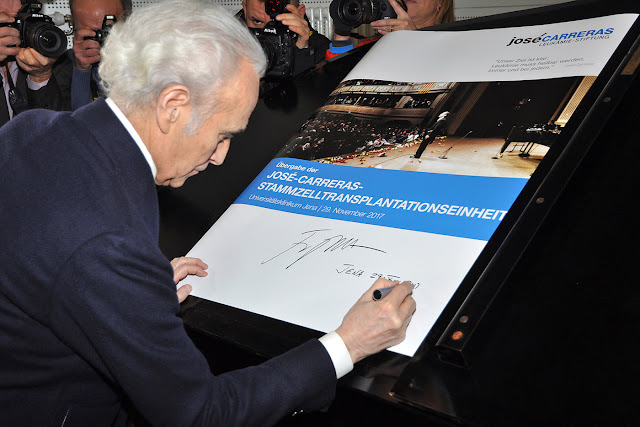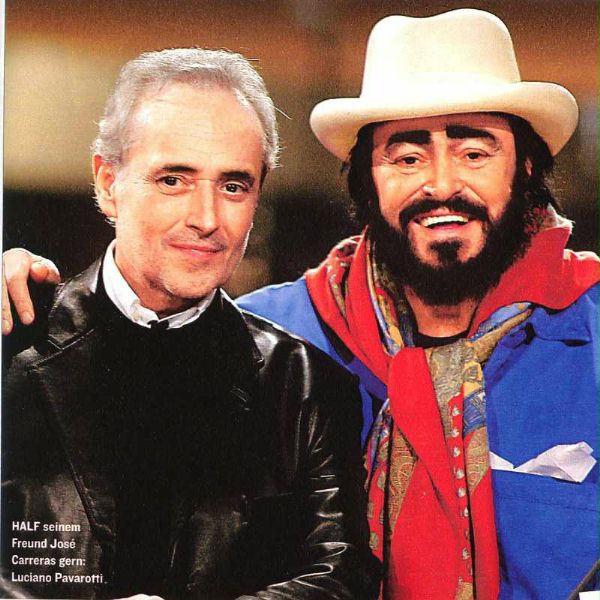"Il Video della Settimana": Josep Carreras in the finale of La Bohème (MET, 1982)
Benvenuti per un nuovo Video della Settimana.
A segnare il post di questa settimana è un'opera tra le più note ed amate in assoluto, con motivo di anniversario del debutto. Josep Carreras ha debuttato come Rodolfo de La Bohème il 12 gennaio del 1972 presso il Teatro Regio di Parma. Come ho già specificato nella nuova ed apposita sezione Historic Dates, questo debutto consegue dalla vittoria del nostro Josep nel prestigioso Concorso Voci Verdiane, nell'edizione del 1971: ha potuto così interpretare la parte di Rodolfo in tre funzioni, a partire dall'Anteprima Giovani del 12, ed ancora 16 e 18 gennaio.
Purtroppo non sono in possesso di altri documenti, se non di una fotografia, che ritrovate nelle Historic Dates.
La Bohème è un'opera che ha accompagnato sempre il nostro tenore nei teatri più presigiosi dal 1972 fino agli anni 90: se non erro l'ultima interpretazione risale al giugno 1993, con due brillanti funzioni alla Staatsoper di Vienna.
Questo titolo pucciniano ha segnato anche vari trionfi anche in America, proprio all'inizio della sua carriera, da San Francisco nel 1973, al Metropolitan di New York prima nel 1975 e poi nel 1977 e 1981/82. Ad affiancarlo, alcuni tra i più grandi soprano come Montserrat Caballé, Mirella Freni, Katia Ricciarelli e Teresa Stratas.
 |
| Josep Carreras as Rodolfo in La Bohème, New York 1982. |
La Bohème è un'opera che ha accompagnato sempre il nostro tenore nei teatri più presigiosi dal 1972 fino agli anni 90: se non erro l'ultima interpretazione risale al giugno 1993, con due brillanti funzioni alla Staatsoper di Vienna.
Questo titolo pucciniano ha segnato anche vari trionfi anche in America, proprio all'inizio della sua carriera, da San Francisco nel 1973, al Metropolitan di New York prima nel 1975 e poi nel 1977 e 1981/82. Ad affiancarlo, alcuni tra i più grandi soprano come Montserrat Caballé, Mirella Freni, Katia Ricciarelli e Teresa Stratas.
Non mi attarderò nel ripercorrere la trama dell'opera, visto che, essendo tra le più famose ed apprezzate, do per scontato che tutti voi abbiano almeno una minima idea dei contenuti. Inoltre, chi ammira Josep Carreras ha sicuramente visto quest'opera più e più volte. Ricordo solo brevemente che questo capolavoro di Giacomo Puccini si basa su libretto di Giuseppe Giacosa e Luigi Illica, e trae ispirazione dal romanzo di Henri Murger, Scènes de la vie de bohème. È ambientata a Parigi nella prima metà del XIX secolo e coniuga la spensieratezza della vita artistica di quattro giovani, ricchi solo di creatività e sentimenti, al tragico dramma dell'epilogo.
Rodolfo è un ruolo ideale per chi, come Josep Carreras, identifica la propria vocalità in quella di un tenore lirico. Alle insidie vocali presenti nelle arie più celebri e non solo, si accosta una notevole difficoltà interpretativa: la parte del poeta, infatti, offre all'interprete la possibilità di incarnare una moltitudine di diversi sentimenti, dall'amore più puro, alla la gelosia, speranza, disperazione. Anche per questo motivo, Carreras è stato uno degli interpreti per eccellenza di questo personaggio.
Senza dubbio, si tratta di un personaggio che suscita tenerezza ed affetto, e questo potrebbe anche essere un motivo in più per risultare gradito al tenore stesso che lo rappresenta. Inizialmente forse un po' frivolo e ingenuo, il nostro caro poeta subisce una notevole maturazione nel corso dell'opera, in particolare nella seconda metà. A partire dall'atto terzo acquisisce una saggezza che intenzionalmente spaccia per una gelosia per altro infondata: mi riferisco al momento de "Mimì è una civetta", una copertura che l'amico Marcello smaschera, inducendolo a confessare la triste realtà, la salute ormai compromessa della donna amata. Da qui nasce uno dei momenti più squisitamente drammatici di tutta l'opera: il re-incontro di Rodolfo e Mimì, e la loro decisione di rimandare la fine della loro relazione al sorgere della primavera, dopo aver rievocato i momenti felici trascorsi insieme. Se non ricordo male, avevo proposto proprio questo frammento in un'edizione del Video della Settimana, circa un anno fa, nella versione del Liceu del 1980.
Oggi invece voglio proporvi uno dei momenti più salienti di quest'opera: si tratta di un frammento un po' lungo che prende avvio da uno degli intermezzi musicali più belli che siano mai stati scritti, ovvero quello che precede il "Sono andati?" di Mimì, dopo il soliloquio di Colline con la celebre "Vecchia Zimarra". Puccini qui è semplicemente straordinario, e questo è uno di quei momenti magici che mi induce a pensare che la sua musica parli al cuore più di quella di compositori anche più eleganti stilisticamente. È senz'altro uno dei più grandi meriti del suo genio. Tutto questo nella versione del Metropolitan del 16 gennaio 1982, prodotta da Franco Zeffirelli e diretta da James Levine, della quale esiste anche il DVD.
 |
| Josep Carreras and Teresa Stratas |
In questo momento, Mimì, interpretata da Teresa Stratas, col volto pallido e ormai prossima alla morte è sdraiata sul letto tra le braccia del suo Rodolfo, al quale dichiara nuovamente il suo sentimento d'amore. Insieme rievocano i dolci momenti, il loro primo incontro, l'aneddoto della chiave ed il tenero approccio del poeta nel riscaldare la sua gelida manina. Rodolfo a stento trattiene le lacrime nel vedere la sua Mimì così malata, tuttavia spera, finché non apprende dagli sguardi dei suoi amici che la sua amata si è ormai spenta. Benché non possiamo certo dire di essere di di fronte ad un'aria del tenore, questo drammatico epilogo che, almeno in apparenza, privilegia le abilità recitative, nasconde comunque difficoltà non indifferenti anche nel canto.
Qui Josep Carreras ha saputo affermare le sue eccellenti doti interpretative senza mai mancare di rispetto alle istruzioni del compositore: nonostante il momento si presterebbe ad azioni molto teatrali di dolore quasi ostentato, cosa che molti fanno ma che Puccini in realtà non aveva previsto, Carreras ancora una volta concilia perfettamente passione e senso della misura. Tuttavia, la reazione del suo Rodolfo nell'apprendere la morte di Mimì per me rimarrà sempre una delle interpretazioni più strazianti e maledettamente convincenti che abbia visto mai. Non vorrei scadere nel patetico, ma seriamente penso che nessun altro sia mai riuscito ad accompagnare con quello sguardo e a pronunciare con quel tono le parole "Che vuol dire... quell'andare e venire? Quel guardarmi così?". Davanti a questo anche una pietra non riuscirebbe ad evitare di commuoversi. La doppia invocazione del nome di Mimì, con la voce straziata dalla disperazione, deve necessariamente prevalere sul volume dell'orchestra, senza contare che la nota si appoggia su una i, la più alta delle vocali, e questo è senz'altro una delle complessità maggiori che il tenore deve affrontare nell'atto quarto de La Bohème.
 |
| Josep Carreras hugely ovationed during the curtain call. |
Nel video ho aggiunto il momento esclusivo di Josep nel curtain-call, quando viene praticamente sommerso dai fiori e dalle ovazioni. Godetevelo!!
Spero abbiate apprezzato la mia proposta di oggi, e che la commozione non vi abbia tradito troppo. L'appuntamento è per domenica prossima con un nuovo video. Buona settimana a tutti!!
Hope you have appreciated my proposal of today, and that it has not caused so many tears. See you next Sunday with a new video. Wish you all a nice week.
Key facts:
◦ What marks the post this week, on occasion a debut anniversary, is one of the most famous and loved opera ever. Josep Carreras made his debut as Rodolfo in La Bohème 41 years ago, on 12 January 1972 at the Teatro Regio in Parma. As I have already written in the new section, Historic Dates, this debut came from Josep's victory in the prestigious Voci Verdiane Contest, in its edition of 1971: then, he was assigned the part of Rodolfo in three performances, starting from the preview for young people on 12, and twice again 16 and 18 January.
Unfortunately, no other document is available but the photo posted in Historic Dates.
◦ La Bohème is an opera that has always accompanied our tenor in most prestigious opera houses from 1972 until the 90s: if I'm notwrong, he latest performed it in June 1993, with two special night at the Vienna State Opera. With La Bohème he achieved several triumphs in the US too, from the very beginning of his career, in San Francisco in 1973, then at the New York's Metropolitan, first in 1975 and again in 1977 and 1981/82. Some of the greatest sopranos joined him, such as Montserrat Caballé, Mirella Freni, Katia Ricciarelli and Teresa Stratas.
◦ La Bohème is an opera that has always accompanied our tenor in most prestigious opera houses from 1972 until the 90s: if I'm notwrong, he latest performed it in June 1993, with two special night at the Vienna State Opera. With La Bohème he achieved several triumphs in the US too, from the very beginning of his career, in San Francisco in 1973, then at the New York's Metropolitan, first in 1975 and again in 1977 and 1981/82. Some of the greatest sopranos joined him, such as Montserrat Caballé, Mirella Freni, Katia Ricciarelli and Teresa Stratas.
This time, I am not going to trace the plot: being one of the most famous and appreciated opera, I am sure you already know it. In addition, those who admire Josep Carreras must have already watched and listen to it over and over again. I just tell you, briefly, that this masterpiece by Giacomo Puccini is based on a libretto by Giuseppe Giacosa and Luigi Illica, and draws inspiration from the novel by Henri Murger, Scènes de la vie de bohème. It is set in Paris in the first half of the nineteenth century and combines the carelessness of artistic life of four young boys, rich only in creativity and good feelings, to the tragedy of the ending.
◦ Rodolfo is an ideal role for someone who, like Josep Carreras, identifies his voice into that of a lyric tenor. The major difficulties lies on the most famous arias and not only, and it deals with a very difficult interpretative approach: the part of the poet, in fact, offers the interpreter a chance to embody a multitude of different feelings, the purest love, jealousy, hope and despair. Also for this reason, Carreras was one of the performers par excellence of this character.
Without doubts, Rodolfo is a character that arouses tenderness and affection, and this could also be a reason to be pleasing to the tenors performing it. Perhaps a little naive at the beginning, our dear poet undergoes a considerable maturation throughout the opera, especially in the second half. From the third Act he becomes wiser, but he intentionally hides it with a false jealousy: I am referring to the moment of "Mimi è una civetta" (Mimì is a owl), a cover his friend Marcello find out,making him confess the sad reality: the illness of the girl he loves. Hence, one of the most purely dramatic moments of all the opera: the re-encounter of Rodolfo and Mimi, and their decision to postpone the end of their relationship at the onset of spring, after having recalled the happy times spent together. If I remember correctly, I proposed this very fragment in an edition of Videos of the Week, about a year ago, in the version of the Liceu in 1980.
◦ But today I would like to offer one of the highlights of this opera: it is quite a long fragment starting with one of the most beautiful musical interludes ever, just preceding Mimì's "Sono andati?", and immediatly after Colline' soliloquy with the popular aria "Vecchia Zimarra". Here, Puccini is simply amazing, and this is one of those magical moments that convinces me that his music speaks to the heart more than other composers, even stylistically finer than him. It is certainly one of the great merits of his genius. All this in the version of the Metropolitan in 1982, January 16, produced by Zeffirelli and conducted by James Levine, of which there is also a DVD.
At this time, Mimi, pale and close to death, is lying on the bed in Rodolfo's arms, whom, once again, she declares her love to. They recall the sweet moments together, their first meeting, the story of the key and the the poet's tender approach with her Gelida Manina. Rodolfo barely holds back tears when he saw his Mimì so sick, but stil hopes until he realises that his beloved has died. Although we are not dealing with a typical tenor aria, this dramatic epilogue appearently requiring mainly acting abilities, it conceals some vocal difficulty too.
◦ Here, Josep Carreras was able to assert his excellent interpretation completely respecting the composer's instructions: despite this very moment could easily provide an exagerate kind of acting, showing off despair, as many singers tend to, regardless Puccini had not really expected this, once again Carreras perfectly combines passion and and moderation. However, his Rodolfo's reaction learning that Mimi has died, will always remain one of the most harrowing and bloody convincing interpretations I've ever seen. I do not want to be pathetic, but I seriously think that no one else has ever managed to combine with such look and such tone the words "Che vuol dire... quell'andare e venire? Quel guardarmi così?" What's that coming and going? that looking at me like that?. Even a stone could not but be touched. The double invocation of the name of Mimi, with his voice torn by despair, must be heard over the orchestra, and the sound is based on an i, the highest vowel, and this is certainly one of the most difficult point a tenor has to face in the fourth act of La Bohème.
In the video, I added the moment of Josep in the curtain-call, when it is practically flooded with flowers and ovations. Enjoy it!
Hope you have appreciated my proposal of today, and that it has not caused so many tears. See you next Sunday with a new video. Wish you all a nice week.



Inoubliable Rodolfo !
ReplyDeleteMerci !!